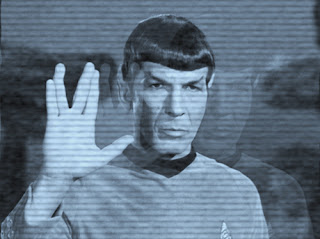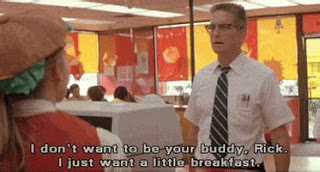In Spock We Trust
If you really want to know why the world is as messed up as it is, there are five people you can blame: John Lennon, Paul McCartney, George Harrison, Ringo Starr and John F. Kennedy. Not that any of them ever claimed to be nefarious villains plotting world domination. The truth is that none of them actually knew they were setting humanity on a course of destruction as they were actually doing it.
Before you go searching for hidden messages in their speeches and lyrics, let me assure you that you won't find any, because the real crimes they committed was actually one crime they all committed: they successfully achieved goals previously only attainable by men three times their ages.
If you know your history, you know that prior to 1960, nobody in the western world expected to be a millionaire before turning 50. In those days, the legends dictated that hard work and persistence would eventually be rewarded with good fortune. If you wanted to achieve greatness any other way, you'd probably have to marry the boss's daughter. Other than that, millionaires took the form of the Monopoly man, balding, graying, with a little paunch and maybe a mustache.
The Beatles and JFK changed all that.
In 1960,at the age of 43, John Kennedy became the youngest candidate elected to the presidency in American history. In 1964, the Beatles were, in John's own words, "bigger than Jesus Christ," and millionaires in their own right, ranging in age from 20 to 23. Which means that in the span of three years, one of the world's greatest wishes was granted and one of its major tenets was destroyed:
You really could be young and have it all (I go into detail about this in my book).
By 1960, the boomer youth culture that began in the late 1950s increased by an order of magnitude, as well-monied, big spending boomers cultivated a tsunami of hedonism that eventually raised the divorce rate, broke up the family, inspired feminism and produced the Me Decade that spawned super selfish fortunes and corporate greed. But there was a far more insidious force in play: the replacement of sound, critical thinking with feelings and non-accountability. Somewhere along the line, steady, rational processes gave way to short cuts and self-indulgence.
On this, I speak from personal experience. I was raised during this time as most traditional notions of family, sex, honor, thought and justice were summarily thrown on the scrap heap in favor of feeling good and "just getting it done without really understanding why." I was a sophomore in college, hopelessly confused about growing up. I mean, I could pose along with the best of them, but I had no idea why I was doing whatever it was I was doing. The thing is, neither did anyone else. We all sprinkled our conversations with familiar hack phrases that made it seem we knew what we were talking about, but we really didn't. And yet we all graduated college, some with honors.
To me, nothing made sense and everything ran counter to traditional development of confidence and character. It became increasingly difficult to figure out not only what to do with my life, but how to go about even thinking about it.
And then one day, I found myself in front of my old, seven inch black and white portable Sony television, watching an old episode of the original Star Trek, where Mr. Spock was calmly explaining to the rest of the Enterprise crew that their seemingly desperate situation wasn't hopeless, and that with a simple application of logic, a solution was at hand.
I was thunder-stuck. In one moment, I realized that all of my own conflicts were due to an upbringing in which feelings and ego had replaced construct and character. This was the reason why nothing in my youthful life made sense: Up to that point, nothing in my head had been required to make sense, so nothing ever worked.
That was the instant that my life changed forever.
From that very second, I committed to never making even the most trivial decision without logical, accountable analysis. And when I say trivial, I'm talking about things as minor as how to leave a room so that I'd never have to retrace my steps after closing the front door. I'd literally sit on the edge of my bed, planning the most efficient means of leaving my roach-ridden apartment in the most time-efficient manner possible.
It worked.
Within a few months, everything in my life, from my grades to my (first) girlfriend sprang up like roses around me. I reveled in the rewards brought to me by simple reason. I never looked back and have enjoyed those rewards ever since. I was lucky. Spock spoke and I listened. Others, however, have not fared so well.
To this day, many of my peers and their offspring, still haven't realized that the world revolves on logic, analysis and critical thinking. They applaud statues being felled, dictionaries being redefined, history and curricula being rewritten to accommodate and soothe their juvenile frustrations, even though most of them are now senior citizens. Of course, they're easy marks for clearer thinkers, but the fact there are so many of them, makes it seem as if they're insurmountable. They're not. A lifetime of screaming and kicking and holding their breaths until they turn blue is now coming to fruition -- and the fruit is plenty rotten.
It's almost over. Logic and reason always wins out. As the man says, "Live long and prosper."


